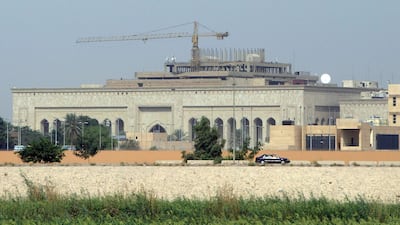At least three rockets were launched at the US embassy in Baghdad's fortified Green Zone on Sunday evening, causing the embassy to activate its defence system, Iraqi security officials said.
Iraqi government blamed an "outlaw group" for the attack and said the rockets were fired from Al Rasheed Camp in the Shiite-dominated east side of Baghdad. But so far no group has claimed the attack.
The rockets landed inside a residential complex and damaged buildings and cars. There were no casualties among civilians were reported, the government said.
The US embassy’s C-RAM defence system was used to destroy the rockets mid-air, three Iraqi security officials told the Associated Press, with damage caused to property and parked cars.
The Green Zone is the seat of key government offices and western diplomatic missions. It has been a frequent target for Sunni and Shiite militants since the 2003 US-led invasion that toppled Saddam Hussein's regime.
Shiite cleric, Muqtada Al Sadr, denounced the attack, accusing the "militias" for putting the civilians in danger "under the pretext of resisting the occupation".
Mr Al Sadr called on the government to declare the state of emergency in Baghdad and protect the civilians and diplomatic missions.
"I'm ready to co-operate in this regard," he said on Twitter. He urged the US embassy not to respond militarily, leaving it to the Iraqi government.
The US has drawn down staff members at the embassy this month before the first anniversary of the Washington-directed killing of Iranian General Qassem Suleimani outside Baghdad’s airport on January 3. US officials said the decision stemmed from concerns about a possible retaliatory strike.
The frequency of rocket attacks have frustrated the Trump administration. Iran-backed militia groups have been blamed for orchestrating the attacks.
In September, Washington warned Iraq that it would close its embassy in Baghdad if the government failed to take decisive action to end rocket and other attacks by Iranian-backed militias on American and allied interests in the country.
When the US announced the intention to withdraw troops from the country in last month, a group of influential Iran-allied Shiite militias announced a ceasefire to allow the process to take place safely.
Shortly after the attack, Kataib Hezbollah, one of the most influential Iran-allied militia groups, denounced the "random firing" of the US military base inside the embassy compound, calling the attack as "undisciplined." It called on the government to chase down the perpetrators.
The leader of Asaib Ahl Al Haq, Qais Al Khazali, also distanced his political party from the attack, saying though "attacking the American occupation bases is a guaranteed right…to liberate our country and to take revenge for our martyrs, but the right time has not come yet".
Sunday's attack was the second breach of the ceasefire.
Last month, four rockets hit the Green Zone out of seven fired from the Shiite-dominated east side of Baghdad. A child was killed and five civilians were wounded, according to a government statement.
The attack was claimed by a previously unknown militia known as Ashab Al Kahf. Powerful militias distanced themselves from the incident and accused unknown parties for attempting to collapse the truce.
Then, the group said that the attack was retaliation for the arrest of three of its members in the town of Fallujah, west of Baghdad, by US troops the day before.


